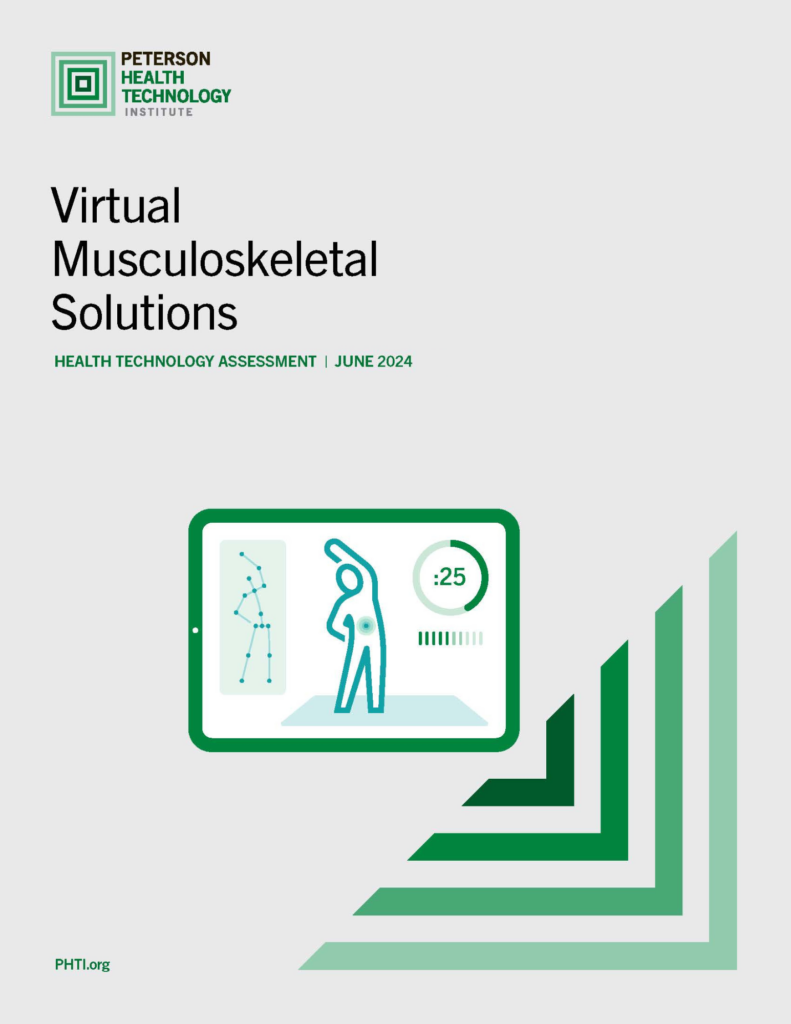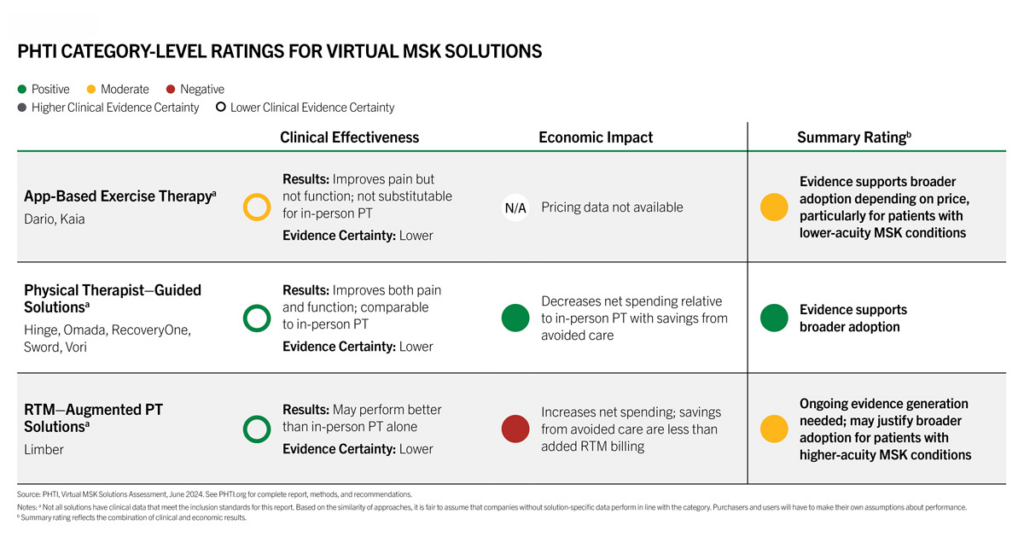completed Assessment
Virtual Musculoskeletal (MSK) Solutions
Assessment Released
Last Updated
October 10, 2024
Conditions
Musculoskeletal (MSK) Care
"*" indicates required fields
PHTI assessed virtual musculoskeletal (MSK) solutions—including virtual physical therapy—that aim to improve pain and functional status for people with MSK disorders.
Area overview
More than one in three Americans experience musculoskeletal (MSK) problems related to their muscles, bones, joints, or connective tissues, which may result from acute injuries, repetitive motion or strain, or osteoarthritis.
Virtual musculoskeletal solutions aim to expand access to care—particularly virtual physical therapy (PT)—that can improve pain and functional status for people with a range of MSK disorders. By making care more available and convenient, these solutions aim to improve patient outcomes and avoid unnecessary treatment. The solutions in this report are assessed in three categories:
- App-based exercise therapy solutions
- Physical therapist-guided solutions
- Remote therapeutic monitoring (RTM)-augmented PT solutions
App-based exercise therapy and physical therapist-guided solutions generally aim to replace in-person care, whereas RTM-augmented PT solutions are meant to supplement in-person care by improving adherence to care plans between in-person PT visits. PHTI assessed clinical outcomes of patients using these virtual MSK solutions, including improvements in pain, function, and adherence, as well as their economic impact compared with in-person PT.
Download the evaluation

Virtual Musculoskeletal Solutions
Updated October 10, 2024
June 5, 2024
Executive SummaryJune 5, 2024
Providers’ GuideJune 5, 2024
Patient GuideJune 5, 2024
Overview for PolicymakersJune 5, 2024
AppendicesAugust 6, 2024
RTM Budget Impact ScenariosJanuary 21, 2026
Performance-Based Contracting ToolkitReport contributors and reviewers provided important expertise and insight throughout our process. Those who directly contributed to the report have no relevant conflicts of interest to disclose.
Summary of findings
Based on PHTI’s review of clinical evidence, the virtual MSK solutions assessed in this report deliver clinically-meaningful improvements in pain and function compared to usual care (which generally includes physician visits and pain management but not PT) for people with a range of MSK disorders. Across the three categories of solutions evaluated, physical therapist-guided solutions can be an effective alternative to in-person PT and have the potential to reduce healthcare spending. At the right price, app-based exercise therapy solutions may be valuable solutions to provide broad-based virtual care for patients with lower acuity. RTM-augmented PT solutions have high clinical efficacy but increase costs, making them most appropriate for more serious MSK disorders. Virtual solutions can close access gaps, particularly among older and rural populations or individuals who cannot easily get to in-person PT clinics.

Webinar
Guidance & considerations for stakeholders
Purchasers
- Negotiate for competitive prices
- Shift to value-based payment arrangements that build on the economic benefits of these solutions
- Begin integrating virtual MSK care into medical, rather than wellness benefit
Innovators
- Virtual MSK solutions should be integrated into medical benefits, not wellness programs, to realize the full potential for savings in MSK care
- Solutions should partner with payers and providers to improve patient triage and build evidence for moderate and high complexity MSK care
Providers
- Encourage more PT-first MSK care
- Make patients aware of the range of therapy options to identify what works best for them
Why assess virtual musculoskeletal solutions?
- More than one in three Americans experience MSK problems related to their muscles, bones, joints, or connective tissues, which may result from acute injuries, repetitive motion or strain, or osteoarthritis.
- Low-income populations tend to be the most affected by MSK disorders, with Black populations more likely to say that pain disrupts their daily life than other populations.
- As the population ages and continues to grow, the incidence of MSK disorders is rapidly increasing.
- A robust market of virtual MSK solutions has emerged that use a combination of clinical and AI-enabled support to guide patients through therapy.
- Purchasers would benefit from a clearer understanding of the range of technology solutions on the market today, how they address purchasing goals (e.g., access, convenience, lower cost of care), and how they can be integrated with existing benefits.
Given the burden of disease and impact on the healthcare system, payers, providers, and patients are eager to understand which virtual MSK solutions provide meaningful results for patients at a lower cost. There are multiple technologies—including ones with computer vision, wearable sensors, and those that leverage AI recommendations—available in the U.S. market. These technologies differ in accuracy, accessibility, ease of use, features, and price.
Additional resources
November 2023
Assessment Area BriefAssessment area brief for PHTI’s assessment of virtually-enabled musculoskeletal (MSK) care tools.
November 2023
Virtually-Enabled Musculoskeletal (MSK) Care Methodology Overview (Presentation with Audio)A review of PHTI protocol for systematic literature review of clinical impact.
October 2023
Systematic literature review of virtual physical therapy among patients with musculoskeletal disordersInternational prospective register of system reviews (PROSPERO), National Institute for Health and Care Research
Contact
Get in touch with us if you want to learn more about opportunities to provide input on this assessment.
"*" indicates required fields
Read an overview of our assessment Approach and Framework
View assessment frameworkRelated news
-
Read ArticleJun 7, 2024News Coverage
CNBC
Digital physical therapy tools provide clinical benefits, report finds
-
Read ArticleJun 6, 2024News Coverage
Fierce Healthcare
Digital physical therapy solutions can improve patient outcomes, reduce healthcare spending, report finds
-
Read ArticleJun 6, 2024News Coverage
STAT
Do digital physical therapy solutions work? New report has some insights
-
Read ArticleJun 6, 2024News Coverage
Modern Healthcare
Report says digital physical therapy is worth the cost—sometimes
-
Read ArticleJun 6, 2024News Coverage
Endpoints News
Virtual physical therapy programs can be just as good as in-person care, report says
-
Jun 5, 2024Announcement
New Analysis: Virtual Musculoskeletal Solutions Improve Health Outcomes and Lower Costs
PHTI’s independent evaluation finds virtual solutions an effective treatment option to expand physical therapy access
Stay up to date
Sign up to receive updates.